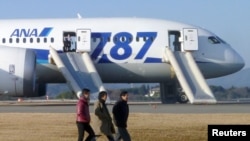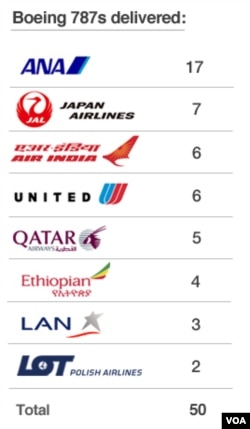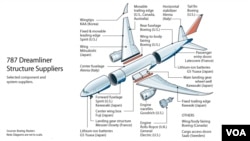International airlines have suspended their entire fleet of Boeing 787 Dreamliners as regulators investigate a fire risk linked to a recent series of battery problems.
The world's 50 Dreamliners were grounded indefinitely on Wednesday and Thursday, forcing their carriers to rearrange dozens of flights, and prompting some to call for compensation from the U.S. aerospace giant.
Japanese airlines ANA and JAL have kept their 24 Dreamliners on the ground since Wednesday, after an ANA 787 on a domestic flight made an emergency landing due to an overheated battery that leaked a flammable fluid. Nine days earlier, a battery caught fire on a JAL 787 parked in Boston.
Late Wednesday, the U.S. Federal Aviation Administration ordered United Airlines to suspend flights by its six Dreamliners until the fire risk is resolved. The action sparked similar action by the other 787 operators: Air India, Qatar Airways, Ethiopian Airlines, Chile-based LAN Airlines and LOT Polish Airlines.
Flight disruptions
Peter Goelz, a Washington-based public relations specialist for major airlines, said he expects the global 787 fleet to be grounded for at least one or two weeks while investigators try to figure out why the jet's lithium-ion batteries are overheating.
Speaking to AlHurra television, O'Neill and Associates executive Goelz said the main impact will be on Japanese carriers' transoceanic flights to the United States and Europe.
Aviation analyst Richard Aboulafia said cancellations of routes such as Tokyo to Boston will force some travelers to transit through hubs, a detour that the long-haul Dreamliner was meant to avoid.
"If the grounding persists for more than a few weeks, you will see more older aircraft come back into the mix," said Aboulafia, an executive at Fairfax, Virginia-based Teal Group Corporation.
Seeking damages
Two Dreamliner carriers intend to ask Boeing to compensate them for the groundings.
Indian Aviation Minister Ajit Singh told television network NDTV that New Delhi will seek reimbursement for state-owned Air India, which operates six of the jets. Also Thursday, LOT Polish Airlines deputy chief Tomasz Balcerzak said Poland's main carrier will file for compensation in "due course."
Airlines' contracts with aircraft builders such as Boeing are confidential, but they typically include guarantees of compensation in cases of mechanical flaws.
Aboulafia said delays in delivering 787s also have forced Boeing to pay billions of dollars in penalties to customers in the past few years.
"There is no doubt that there is tension. But if Boeing works with the airlines to fix the problems, all will be forgiven and the Dreamliner will enter service as planned."
In a statement released Wednesday, Boeing chief executive Jim McNerney expressed "deep regret" for the inconvenience caused to airlines and passengers. He also said Boeing is "confident" in the Dreamliner's "overall integrity" and promised to take "every necessary step" to ensure safety and return the jet to service.
Maintaining loyalty
Boeing is under contract to deliver another 798 Dreamliners to various airlines in the coming years. In a boost for the aircraft maker, several customers reaffirmed their orders on Wednesday, including Australia's Qantas, British Airways and Singapore Airlines.
Mike Mecham, senior editor of Aviation Week & Space Technology , said he is not surprised by the expressions of support.
"If you go back four years, when Boeing's manufacturing program started to fall behind schedule, it simply did not lose customers," he said. "Some dropped 787 orders for financial reasons because there was an economic downturn. But they remained confident in the airplane."
Mecham also said teething problems with new commercial planes are seen as relatively normal.
"Obviously if you have hot batteries and you are getting (burning) smells in cabins, then that is a pretty significant teething problem. But, people are accustomed to difficulties with new, complex aircraft. So I think airlines have a pretty high tolerance level."
Production fallout
Boeing hopes to speed up its production of Dreamliners to 10 per month by the end of this year, from a rate of five per month last November. Aboulafia said the probable need to modify the jet makes that target unlikely.
"We are going to have some kind of slowdown. Last year, production was unexpectedly high. Boeing got 46 Dreamliners out of the door, but perhaps they should have taken a bit more time and made certain that all the quirks were ironed out."
A slowdown could affect some of the more than 50 foreign companies that supplied Boeing with the Dreamliner's engine, fuselage, wings, entry doors and landing gear and other parts.
Boeing's financial cost from slowing production and grounded planes likely will remain unclear until the causes of 787 mishaps are determined.
Beating the competition
Prior to those incidents, Boeing had a successful 2012, overtaking main rival Airbus in total sales and deliveries of commercial planes for the first time in years. Boeing announces its October to December results on January 30.
Aboulafia predicted Boeing will report a "fantastic" quarter based on a "solid" output of commercial planes and resilient U.S. government spending on its military products.
"But, a shadow will be cast over the results by the Dreamliner experience," he said.
The world's 50 Dreamliners were grounded indefinitely on Wednesday and Thursday, forcing their carriers to rearrange dozens of flights, and prompting some to call for compensation from the U.S. aerospace giant.
Japanese airlines ANA and JAL have kept their 24 Dreamliners on the ground since Wednesday, after an ANA 787 on a domestic flight made an emergency landing due to an overheated battery that leaked a flammable fluid. Nine days earlier, a battery caught fire on a JAL 787 parked in Boston.
Late Wednesday, the U.S. Federal Aviation Administration ordered United Airlines to suspend flights by its six Dreamliners until the fire risk is resolved. The action sparked similar action by the other 787 operators: Air India, Qatar Airways, Ethiopian Airlines, Chile-based LAN Airlines and LOT Polish Airlines.
Flight disruptions
Peter Goelz, a Washington-based public relations specialist for major airlines, said he expects the global 787 fleet to be grounded for at least one or two weeks while investigators try to figure out why the jet's lithium-ion batteries are overheating.
Speaking to AlHurra television, O'Neill and Associates executive Goelz said the main impact will be on Japanese carriers' transoceanic flights to the United States and Europe.
Aviation analyst Richard Aboulafia said cancellations of routes such as Tokyo to Boston will force some travelers to transit through hubs, a detour that the long-haul Dreamliner was meant to avoid.
"If the grounding persists for more than a few weeks, you will see more older aircraft come back into the mix," said Aboulafia, an executive at Fairfax, Virginia-based Teal Group Corporation.
Seeking damages
Two Dreamliner carriers intend to ask Boeing to compensate them for the groundings.
Indian Aviation Minister Ajit Singh told television network NDTV that New Delhi will seek reimbursement for state-owned Air India, which operates six of the jets. Also Thursday, LOT Polish Airlines deputy chief Tomasz Balcerzak said Poland's main carrier will file for compensation in "due course."
Airlines' contracts with aircraft builders such as Boeing are confidential, but they typically include guarantees of compensation in cases of mechanical flaws.
Aboulafia said delays in delivering 787s also have forced Boeing to pay billions of dollars in penalties to customers in the past few years.
"There is no doubt that there is tension. But if Boeing works with the airlines to fix the problems, all will be forgiven and the Dreamliner will enter service as planned."
In a statement released Wednesday, Boeing chief executive Jim McNerney expressed "deep regret" for the inconvenience caused to airlines and passengers. He also said Boeing is "confident" in the Dreamliner's "overall integrity" and promised to take "every necessary step" to ensure safety and return the jet to service.
Maintaining loyalty
Boeing is under contract to deliver another 798 Dreamliners to various airlines in the coming years. In a boost for the aircraft maker, several customers reaffirmed their orders on Wednesday, including Australia's Qantas, British Airways and Singapore Airlines.
Mike Mecham, senior editor of Aviation Week & Space Technology , said he is not surprised by the expressions of support.
"If you go back four years, when Boeing's manufacturing program started to fall behind schedule, it simply did not lose customers," he said. "Some dropped 787 orders for financial reasons because there was an economic downturn. But they remained confident in the airplane."
Mecham also said teething problems with new commercial planes are seen as relatively normal.
"Obviously if you have hot batteries and you are getting (burning) smells in cabins, then that is a pretty significant teething problem. But, people are accustomed to difficulties with new, complex aircraft. So I think airlines have a pretty high tolerance level."
Production fallout
Boeing hopes to speed up its production of Dreamliners to 10 per month by the end of this year, from a rate of five per month last November. Aboulafia said the probable need to modify the jet makes that target unlikely.
"We are going to have some kind of slowdown. Last year, production was unexpectedly high. Boeing got 46 Dreamliners out of the door, but perhaps they should have taken a bit more time and made certain that all the quirks were ironed out."
A slowdown could affect some of the more than 50 foreign companies that supplied Boeing with the Dreamliner's engine, fuselage, wings, entry doors and landing gear and other parts.
Boeing's financial cost from slowing production and grounded planes likely will remain unclear until the causes of 787 mishaps are determined.
Beating the competition
Prior to those incidents, Boeing had a successful 2012, overtaking main rival Airbus in total sales and deliveries of commercial planes for the first time in years. Boeing announces its October to December results on January 30.
Aboulafia predicted Boeing will report a "fantastic" quarter based on a "solid" output of commercial planes and resilient U.S. government spending on its military products.
"But, a shadow will be cast over the results by the Dreamliner experience," he said.






